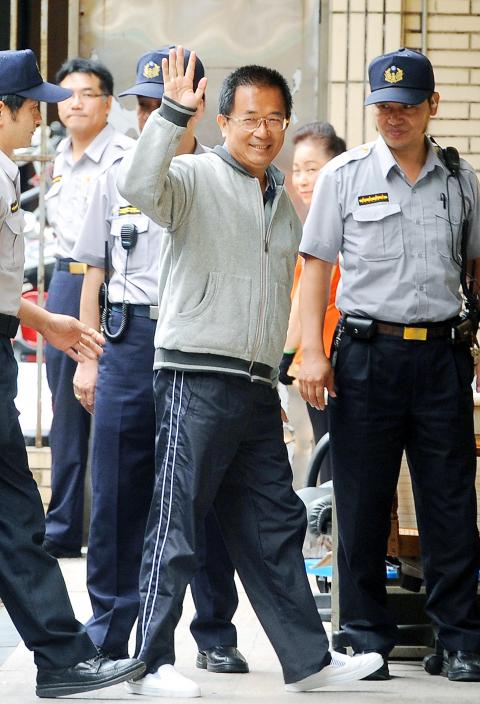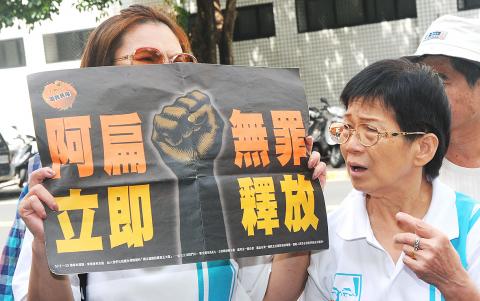The Taiwan High Court yesterday rescinded previous rulings and found former president Chen Shui-bian (陳水扁) and former first lady Wu Shu-jen (吳淑珍) not guilty of corruption, in a retrial of their state affairs fund case.
However, it upheld Chen’s previous conviction for his role in the use of fraudulent receipts to obtain reimbursement for spending from the state affairs fund. On that charge, Chen was given an additional 20-month prison sentence that was cut to 10 months in accordance with a commutation statute.
The court also upheld Chen’s conviction for his role in a money laundering case that concerned a land deal in Taoyuan County’s Longtan (龍潭) and sentenced him to another two years in prison.

Photo: AFP
The new ruling leaves Chen, who is serving a 17.5-year sentence on corruption charges, with an additional two years and eight months in prison and a fine of NT$3 million (US$103,400).
Wu, while acquitted on charges relating to the embezzlement of money from the state affairs fund, was given a 20-month sentence for forgery in the matter of the fraudulent receipts. This sentence was also cut to 10 months in accordance with a commutation statute.
In the money laundering case, Wu was sentenced to two years in prison. She was also given another sentence of nine years in prison for her involvement in a bribery case related to the construction of the Nangang Exhibition Hall. The court ruled that Wu should be jailed for 11 years and six months, in addition to paying a fine of NT$22 million and being stripped of her civic rights for five years.

Photo: Liu Hsin-de, Taipei Times
Last November, the Supreme Court sentenced Chen and Wu to 17.5 years in prison for involvement in the Longtan case and the appointment of Diana Chen (陳敏薰) as the chairperson of the Taipei Financial Center Corp (台北金融大樓公司).
The court at the time ordered a retrial of the state affairs fund embezzlement, money laundering and Nangang Exhibition Hall cases.
Taiwan High Court spokesman Chen Ching-chiao (陳晴教) yesterday said the court acquitted Chen of corruption in the state affairs fund case because he had spent more than the funds he received during his terms in office and spent all of the money on state affairs, including 21 secret diplomacy programs and bonuses to his staff.
Chen’s lawyer, Shih Yi-lin (石宜琳), said Chen has expressed gratitude about the ruling as well as regret over the sloppiness of the workings of state apparatus in his hasty detainment.
“We would like to think today’s verdict is related to the decriminalization of personal use of the ‘special affairs funds,’ because what the state affairs funds mean to the president is actually what the special affairs funds mean to different levels of government officials,” Shih said.
Personal use of the special affairs funds was decriminalized in May, ending a string of embezzlement cases against dozens of officials.
In its representation, Chen’s legal team also cited President Ma Ying-jeou’s (馬英九) “reservoir theory,” which Ma used to defend his use of the special funds during his stint as Taipei mayor and which successfully saw Ma through his own embezzlement case.
While Shih said Chen would decide whether to appeal the money-laundering and forgery charges after reviewing the written ruling, the supreme prosecutors’ office’s Special Investigation Division said it would appeal the ruling.
Commenting on the ruling, Democratic Progressive Party (DPP) Chairperson and presidential candidate Tsai Ing-wen (蔡英文) said the state affairs funds case “contains historical factors” which the DPP believes the judiciary should take into account, while upholding fairness, independence and respect for human rights during the legal process.
Both the Presidential Office and Chinese Nationalist Party (KMT) spokesperson Lai Su-ju (賴素如) said they respected the court’s decision. KMT Legislator Chiu Yi (邱毅), on the other hand, said he found the ruling shocking and slammed the judges “for selling their souls to the devil.”
The court also sentenced Chen’s son, Chen Chih-chung (陳致中) and daughter-in-law, Huang Jui-ching (黃睿靚), to 14 months and 12 months respectively for their roles in the money-laundering case. Huang was given four-years’ probation.
Chen Chih-chung said he was happy his father had been found innocent, but could not accept the verdict handed down to him and would appeal.
Additional reporting by CNA

SECURITY: As China is ‘reshaping’ Hong Kong’s population, Taiwan must raise the eligibility threshold for applications from Hong Kongers, Chiu Chui-cheng said When Hong Kong and Macau citizens apply for residency in Taiwan, it would be under a new category that includes a “national security observation period,” Mainland Affairs Council (MAC) Minister Chiu Chui-cheng (邱垂正) said yesterday. President William Lai (賴清德) on March 13 announced 17 strategies to counter China’s aggression toward Taiwan, including incorporating national security considerations into the review process for residency applications from Hong Kong and Macau citizens. The situation in Hong Kong is constantly changing, Chiu said to media yesterday on the sidelines of the Taipei Technology Run hosted by the Taipei Neihu Technology Park Development Association. With

CARROT AND STICK: While unrelenting in its military threats, China attracted nearly 40,000 Taiwanese to over 400 business events last year Nearly 40,000 Taiwanese last year joined industry events in China, such as conferences and trade fairs, supported by the Chinese government, a study showed yesterday, as Beijing ramps up a charm offensive toward Taipei alongside military pressure. China has long taken a carrot-and-stick approach to Taiwan, threatening it with the prospect of military action while reaching out to those it believes are amenable to Beijing’s point of view. Taiwanese security officials are wary of what they see as Beijing’s influence campaigns to sway public opinion after Taipei and Beijing gradually resumed travel links halted by the COVID-19 pandemic, but the scale of

A US Marine Corps regiment equipped with Naval Strike Missiles (NSM) is set to participate in the upcoming Balikatan 25 exercise in the Luzon Strait, marking the system’s first-ever deployment in the Philippines. US and Philippine officials have separately confirmed that the Navy Marine Expeditionary Ship Interdiction System (NMESIS) — the mobile launch platform for the Naval Strike Missile — would take part in the joint exercise. The missiles are being deployed to “a strategic first island chain chokepoint” in the waters between Taiwan proper and the Philippines, US-based Naval News reported. “The Luzon Strait and Bashi Channel represent a critical access

Pope Francis is be laid to rest on Saturday after lying in state for three days in St Peter’s Basilica, where the faithful are expected to flock to pay their respects to history’s first Latin American pontiff. The cardinals met yesterday in the Vatican’s synod hall to chart the next steps before a conclave begins to choose Francis’ successor, as condolences poured in from around the world. According to current norms, the conclave must begin between May 5 and 10. The cardinals set the funeral for Saturday at 10am in St Peter’s Square, to be celebrated by the dean of the College